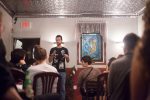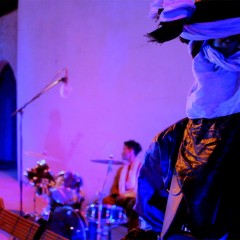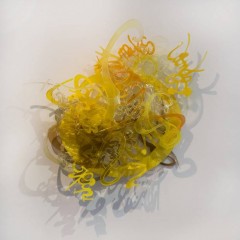On the first Friday of the new year at the PhilaMOCA, the final wave of people shuffled in, swapped hugs, and greeted half the room before taking their seats. Two figures approach the stage, poet laureate Kai Davis and organizer Jacob Winterstein, and the audience grew louder instead of hushing for the Philly Pigeon. The Pigeon, a decade-old event, was a slam league drawing nationally-established and emerging poets before the pandemic. The Pigeon returned this fall with a new twist and format: the show is now a combination of an open mic, live poetry show, and a Friday late-night style comedic interview. Furthermore, the Pigeon is a community-building site and a welcoming cultural space for artistic exploration and exchange. In Winterstein’s final comments before the show began, with many members in the seats admittedly Philadelphia poetry scene regulars or newbies, he dropped a sentence that preemptively summarized the night that was “we have a tagline for the show: honest vulnerability meets irreverent fun.”
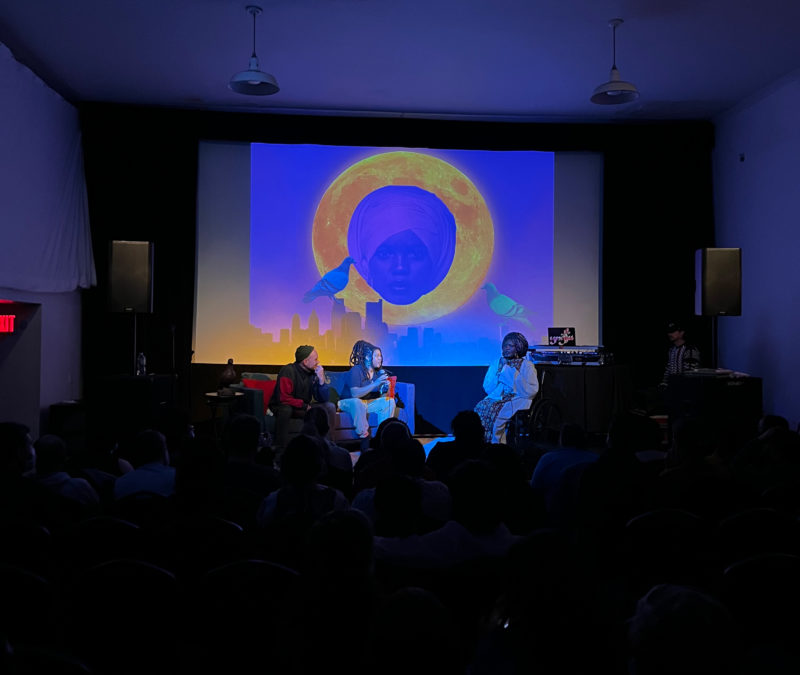
Irreverent fun was correct, as the audience quieted for the six volunteers, including guest volunteer and Lambda literary poetry fellow Imani Davis, who had brought a three-minute-long poem and a haiku. One by one, the performers walked up to the stage, and shared their first pieces. Their topics varied, from Black resistance, suturing a complicated maternal relationship, to critiquing hypocritical feminist men. The experience of the open mic poets also varied similarly to all their themes surrounding social resistance, from two poetry fellows to this event being one volunteer’s first time ever performing in front of an audience.
After the open mic performers, a figure donning white fabric and Northeast African prints in a wheelchair made their way up to the stage. Afaq Mahmoud, a West Philadelphia-based Sudanese poet, photographer, and activist, took their space by providing content warnings for what they were about to share. Mahmoud, a previous Philly Pigeon slam winner, read directly from their journal. Mahmoud’s poetic prose entries addressed topics surrounding abuse, immigration, trauma from the Darfur war, structural racism and ableism, and mourning people and relationships that had passed by using comprehensive, colorful imagery that was as tangible as tender. The entries were as equally devastating as they were relatable. The audience nodded, wept, gasped, and cooed along as Afaq invited the crowd in front of them to hear words that they intended to only be heard by the people in that room and some words they had shared with the world previously.
In a piece Mahmoud wrote as a eulogy to a loved one, they use eloquent language which describes small, intimate slices of life between them and their dearly departed are paired with unique image pairings between words that paint a picture that doesn’t initially coming to mind. In one selection from this poetic journal entry, Mahmoud says
“my sweat reminds me of your inoffensive stink. to sweat is to react to living, and when you were happiest you stunk. the way some flowers do after they’re crushed. the way everything dies after it is dead.”
In these poetic lines like above, many audience members clung to each other or murmured in a collective hum. In one of the later pieces they read, they cited Warsan Shire, a Somali-British viral poet laureate whose work also focused on being punished by the world for her state of Black immigrant womanhood, as one of their inspirations and mentor for said written work. As a poetic review and criticism, Mahmoud can be placed as a protege and later contemporary in the lineage of Warsan Shire. Through this reading, Shire’s stylistic influence, like the minimal elaboration in her poetry’s lines and succinct imagery that is evocative of memory, is clear in Mahmoud’s work as much as it is entirely their own.
In their following interview on the Pigeon’s lounging couch, Mahmoud elaborated on these themes and how racism and ableism dictate the way the public treats them as a poet with disabilities. After recently becoming visibly disabled, they explained their writing and photography process is “write things down when they cannot bear the thought anymore” and then they share it in their craft. When they and their sister, also an award-winning poet named Emi Mahmoud, were little they explained the kind of activism they had to do about their traumas became something they had to de-center themselves from. They realized they can’t separate their trauma and identities from themself because all the marginalized things are them.
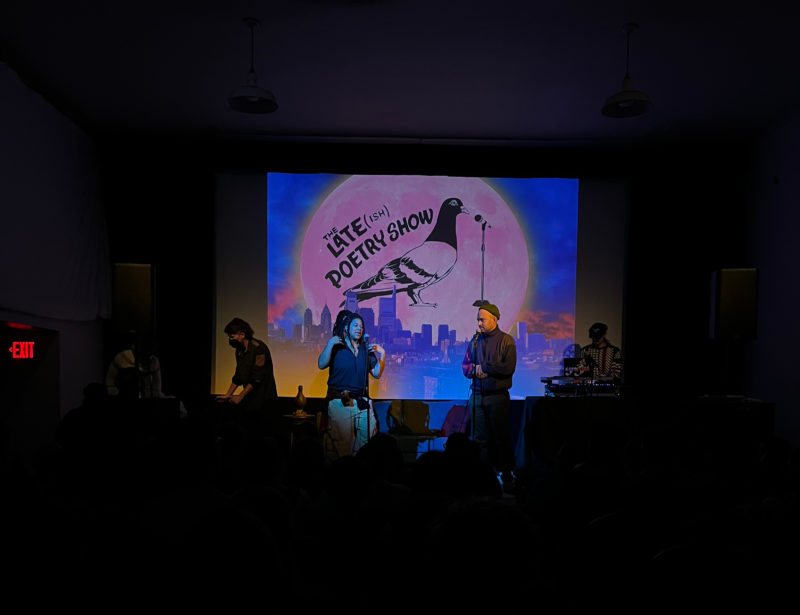
After the interview, Kai Davis and Jacob Winterstein shifted the introspective mood of the show to the cheeky variety show where they invited the open mic performers to perform their haikus as exaggerated stereotypical viral slam poems and read song lyrics in superfluous slam poem renditions.
There are many possible reasons that the leaders of the Pigeon have shifted away from its original slam league, a reason being diverging from the high-stress and competitive format of poetry slams. Kai Davis, in particular, has shared through satirical examples of white and male poets on Instagram, her qualms with slam events being how slams exclude the artistic integrity of Black and People of Color (PoC) spaces. The Pigeon, especially since its new format start, has only invited Black or PoC performers, and the jokes the hosts and guests throughout the show alluded to different parts of immigrant and especially Black Philadelphian experiences.
The Pigeon is a space of poetic community-building for marginalized poets and aficionados where the organizers and talented performers do not just try to include marginalized voices but address the crowd as if this space was made for them instead. It is a space for marginalized poets to come in, share their voices, connect with overarching poetic descriptions of resistance, and appreciate poetry as an art form where the poet’s words uncover memories. The organizers even made an effort to leave the audience with a good feeling as emotional aftercare after a heavy setlist.
Every show of the Pigeon is unique, as a poetry show is a one of one performance even if it involves rereading the same poem. The Pigeon is an invitation from these talented artists to witness extra context to their work while cultivating an engaging, comforting safe haven for Black and PoC artists.
Visit the Philly Pigeon website and experience the entertaining sanctity of the Pigeon as a Black or PoC poetry enthusiast that stays in and fills up the PhilaMOCA room.



